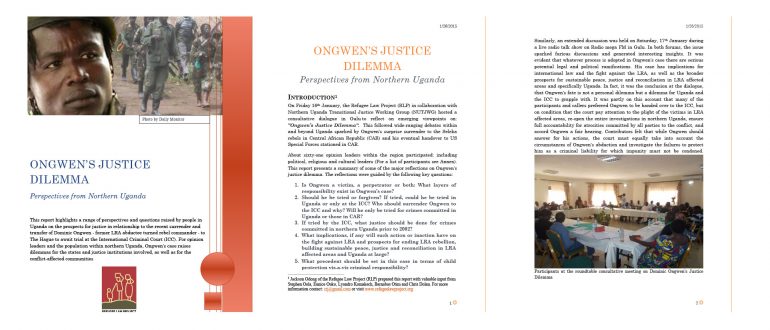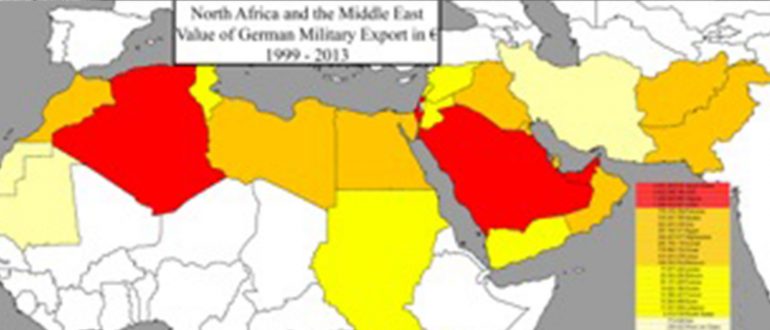Prosecuting Crimes in Ongoing Intrastate Conflicts – Dilemmas of Peace and Justice
1. Introduction
When the Allied Forces brought some of the worst perpetrators of crimes committed by the Nazi Regime and its followers to trial in Nuremberg more than 65 years ago, there was a hope that delivering justice would prevent such crimes in future. This hope was abandoned for several decades as Cold War disagreements rendered the establishment of further international criminal tribunals all but impossible. Today, the International Criminal Court (ICC), established in 2003, has reinvigorated the approach to ensure peace through justice. Yet, little is known about the effects that international criminal tribunals have on conflicts. Despite this lack of knowledge, tribunals like the International Criminal Tribunal for the Former Yugoslavia (ICTY) and the ICC have taken up their work in conflict contexts. The United Nations Security Council referral of the Libyan situation to the ICC in resolution 1970 is just the most recent example. Yet, the question remains whether judicial interventions in ongoing conflicts can help to end fighting or if they prolong and perpetuate the conflict.
2. Transitional Justice in Conflicts
The common aim of the ICC and other criminal tribunals is to counter impunity for crimes that go beyond the scope of domestic legal systems. The institutional requirements for punishing these crimes are either not in place at the domestic level, or the perpetrators are (former) wielders of power who can ensure their impunity through their influence on the national legal system. It is also sometimes the case that the state in question is just not willing to tackle the issue of crimes committed in the past.
But these institutions are also playing an increasingly important role at the level of conflict resolution. Many scholars claim that future conflicts can be prevented through establishing (criminal) accountability, since the fair and just outcome of a conflict is needed for successful conflict resolution. Promoting international criminal law thus follows two ideas: 1) to deter future crimes by the threat of punishment, everywhere and 2) to shape the future of postconflict societies through addressing issues of guilt and retribution, in order to avoid that they disrupt social interactions in post conflict societies and contribute to renewed violence.
These ideas contrast with more traditional approaches that focus on ending the violence. Tackling these issues of justice is predominantly being discussed under the rubric of transitional justice. But the question of how war crimes and human rights abuses should be treated during an ongoing conflict has rarely been discussed in the field. Meanwhile, the question is becoming ever more urgent as the high number of civilian casualties in modern intrastate conflicts shows. Additionally, most human rights violations in conflicts are today being committed in intrastate conflicts. The population of the fragile states embroiled in these intrastate conflicts is in special need of protection against human rights infringements and atrocities. Since the rule of law in these areas has often broken down, and local courts are ineffective due to corruption and weak state capacities, the question of how respect for even the most basic human rights can be promoted in these areas is of immense relevance. So far concepts of transitional justice have often been transferred from transition contexts to conflict contexts without too much thought if the same models work in both environments.
3. The Special Role of the ICC
The fact that the ICC started operations in 2003 has given these questions an empirical background. Since the ICC is a permanent court with a relatively broad and potentially global jurisdiction1 it has more possibilities to become active in ongoing conflicts than the international criminal tribunals created to date. The jurisdiction of tribunals created so far primarily lies with delivering transitional justice in post-conflict phases. The ICC on the other hand, is already investigating incidents in ongoing conflicts and has even indicted leaders of conflict parties that have allegedly committed war crimes or crimes against humanity in Sudan and Uganda. The tendency to pursue crimes in conflicts can thus be expected to increase, especially when taking the rising number of ratifications of the statute into consideration. The Office of the Prosecutor of the ICC embraces this development, stating that:
‘[t]he ICC’s mandate to select the most serious crimes committed after July 1, 2002, requires that we engage in judicial proceedings in relation to conflicts even before they have ended. […] My Office is 1 The UN Security Council can refer cases in states that have not signed the Rome Treaty to the ICC, thus making the ICC a potentially universal institution. part of a new system dealing with a complex new reality: transitional justice during ongoing conflicts.’ (Moreno Ocampo 2007, p. 9).
If the involvement of the ICC in conflict situations proves to be a consistent trend, it will lead to a systematic global relevance of the question whether justice can broker peace.
Yet, a number of difficult questions concerning the relationship between peace and justice arise when transitional justice moves into conflicts. Some of these questions have been discussed extensively, others are entirely new: Can quick and resolved legal reactions to human rights abuses in conflicts help to end them faster or to stop them from escalating? Can the application and enforcement of international criminal law from the outside help to defuse or even transform a conflict? Can the indictment of leaders resorting to brutal methods of warfare help to isolate them by increasing the pressure on their external supporters? All of these issues are aiming at the million dollar question of peace and justice in conflicts: Can transitional justice in conflicts further conflict resolution efforts? The supporters of criminal tribunals do think so. For example Luis Moreno-Ocampo, Chief Prosecutor of the ICC, claims that the ICC brings warlords to the negotiation table, focuses the debates surrounding the conflict on accountability issues, helps in reducing crimes, weakens the support of spoilers by de-legitimisation and ensures harmony in post-conflict situations through dealing with past atrocities (Moreno Ocampo 2008, p. 13).
Critics of the court on the other hand suggest that investigations and prosecutions in conflicts could lead to an impasse in peace negotiations and other forms of peaceful conflict resolution and management efforts because parties might reject a compromise out of the fear of being tried after the conflict. Some authors go as far as claiming a connection between criminal prosecution in conflicts and rising tensions or conflict intensity.
It is consensual that ‘accountability and conflict resolution measures are dynamically linked’ (Sriram 2008, p. 306), but the question remains how. Both sides in the debate describe effects largely not proven by empirical evidence to support their thesis. Some of these effects directly contradict each other. The two opposing views regarding criminal justice in conflicts can best be illustrated by comparing citations of its supporters and critics. Moreno Ocampo describes the idea behind the ICC with the following words:
‘In 1998, 120 states signed the Rome Statute moving from a world based on power to one based on law. They agreed to create an independent and permanent International Criminal Court to ‘put an end to impunity for the perpetrators of the most serious crimes of concern to the international community.’ (Moreno Ocampo 2007, p. 8).
This position is supported by a number of authors who emphasise the need for accountability and justice in conflict resolution (Crowley 2010, du Plessis and Ford 2008, p. X, Lederach 1995, Thony and Schneider 2003, p. 33, Van Acker 2004, p. 356). On the other hand, Roy Licklider, author of the Civil War Termination Database at the Rutgers State University of New Jersey, points out the risks of enforcing retributive justice in conflicts in order to create a supposedly sustainable peace:
‘We are not just engaged in academic debates now; we are talking about other people’s countries and other people’s lives. And we do not know, in such a manner as to persuade others, what is true, what will work […].’(Licklider 2008 p. 385).
Licklider’s position again represents a number of authors criticising the attempts to bring western notions of justice to internal conflicts from the outside (Mamdani 2009, Mendeloff 2004, Snyder and Vinjamuri 2003, Thakur 2006).
4. Conclusion
The stakes of delivering transitional justice in conflicts are high, and these questions are too important and pressing to ignore them. The problem is highly complex as the investigations of the ICC in Darfur, Uganda and Libya have shown. In Darfur, the conflict is still raging on after the ICC indicted the Sudanese President. Several NGOs were thrown out after the indictments were issued and open disagreement between the African Union and the ICC over the indictments has emerged. In Uganda, the ICC arrest warrants apparently forced the Lord’s Resistance Army to negotiate but also played a role in the failure of the same negotiations. In Libya a military stalemate is emerging, and a possible indictment of Al Khadafy will complicate negotiations if they become necessary.
Yet, the holding of trials has become a mainstream demand of civil society groups and NGOs in reaction to atrocities. Trials are also increasingly being used as peacemaking instruments in international crisis management. The limits, the effectiveness as well as the costs and utilities of international criminal tribunals are not understood in a crucial moment when the system is definitely entering its practice phase.
Patrick Wegner
Bibliography:
CROWLEY, P. J. 2010. Africa: Daily Press Briefing. Available:
http://www.state.gov/r/pa/prs/dpb/2010/07/144993.htm [Accessed 23 July 2010].
DU PLESSIS, M. & FORD, J. 2008. Executive Summary. In: DU PLESSIS, M. & FORD, J. (eds.) Unable or Unwilling? Studies on Domestic Implementation of the ICC Statute in Selected African Countries. Pretoria: Institute for Security Studies.
LEDERACH, J. P. 1995. Preparing for Peace: Conflict Transformation across Cultures., Syracuse, N.Y., Syracuse University Press.
LICKLIDER, R. 2008. Ethical Advice: Conflict Management vs. Human Rights in Ending Civil Wars. Journal of Human Rights, 7, 376-387.
MAMDANI, M. 2009. Saviors and Survivors: Darfur, Politics and the War on Terror, New York, Pantheon Books.
MENDELOFF, D. 2004. Truth-Seeking, Truth-Telling, and Postconflict Peacebuilding: Curb the Enthusiasm? International Studies Review, 6, 355–380.
MORENO OCAMPO, L. 2007. Transitional Justice in Ongoing Conflicts. The International Journal of Transitional Justice, 1, 8-9.
MORENO OCAMPO, L. 2008. Building a Future on Peace and Justice: The International Criminal Court. In: AMBOS, K., LARGE, J. & WIERDA, M. (eds.) Building a Future on Peace and Justice: Studies on Transitional Justice, Peace and Development. Heidelberg: Springer.
SNYDER, J. & VINJAMURI, L. 2003. Trials and Errors: Principles and Pragmatism in Strategies of International Justice. International Security, 28, 5-44.
SRIRAM, C. L. 2008. Conflict Mediation and the ICC: Challenges and Options for Pursuing Peace with Justice at the Regional Level. In: AMBOS, K., LARGE, J. & WIERDA, M. (eds.) Building a Future on Peace and Justice: Studies on Transitional Justice, Peace and Development. Heidelberg:
Springer.
THAKUR, R. 2006. The United Nations, Peace and Security: From Collective Security to the Responsibility to Protect, Cambridge, Cambridge University Press.
THONY, K. & SCHNEIDER, P. 2003. Der Beitrag internationaler Gerichte zur Zivilisierung des Konfliktaustrags: Ein Forschungsbericht. In: SCHNEIDER, P. (ed.) Internationale Gerichtsbarkeit als Instrument friedlicher Streitbeilegung: Frieden durch Recht IV. Baden-Baden: Nomos.
VAN ACKER, F. 2004. Uganda and the Lord’s Resistance Army, the New Order no One Ordered. African Affairs, 335-357.


